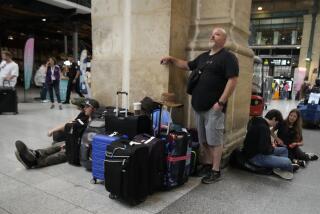Bombs End Age of Innocence for Russian Travelers
- Share via
MOSCOW — Two opaque plastic jugs that originally contained motor oil sat unattended on a busy platform of the Byelorussky train station.
The wires and odd strips of metal connecting their spouts and handles stirred so little concern among the idling travelers that some tossed burning cigarette butts in their direction, and a porter--asked by a foreigner to have police check that they weren’t part of a bomb--simply hefted the suspicious containers and shook them.
“It’s nothing but empty bottles,” he muttered with irritation in the mid-July incident. “Don’t be so nervous. This isn’t America.”
But since a Chechen guerrilla commando declared a “rail war” against Russia in late July and bombs have ripped through trains, streetcars, subways and roadways, an age of innocence in Russian travel has been replaced by a new era of suspicion.
Moscow’s 150 Metro subway stations and nine central train stations now look like armed camps, with camouflage-clad paratroopers patrolling the bustling platforms and bomb disposal teams carting off hundreds of unclaimed bags and packages each day.
Travelers and conductors on Russia’s vast network of trains have become so alert to strange and unattended objects that all but one of seven bombs planted over the last two weeks with a “Chechen trace”--TNT hidden in Turkish cooking oil containers--were found and disarmed before they exploded.
The one device that went undetected detonated aboard a railway car in Volgograd on July 26 after passengers had disembarked, causing no casualties.
Bombings of Moscow streetcars and subways have had more deadly effect, with four people killed in a June 12 blast on a central subway line and more than 30 injured in two explosions aboard streetcars in mid-July.
Moscow Mayor Yuri M. Luzhkov has ordered tighter security throughout the capital. He accuses Chechen separatists, fighting federal troops for control of their southern homeland, of masterminding this summer of transport terror.
While the rash of attacks has rattled the nerves of commuters and vacationers across Russia, Muscovites have become especially vigilant.
“We have been getting a huge number of calls from people concerned about unattended packages and bags left in Moscow transport,” said Igor Tsyryulnikov, a spokesman for the city police force.
Security consciousness has previously been almost nonexistent among Russian travelers, long shielded from the threat of terrorism by closed borders and a police state.
Even with the Soviet-era facade of national unity shattered by the war in Chechnya, the millions taking advantage of the new freedom of movement to work in the “shuttle trade”--going abroad to buy goods for resale at home--have routinely relied on the willingness of less burdened travelers to check excess luggage for them so that they can avoid paying for it.
But this summer’s transport bombings have finally prodded air travelers to raise their guard.
“No way!” one young woman told a heavily laden trader at a Moscow airport who wanted her to check one of his bags for a flight to Vladivostok. “How do I know what’s inside?”
Meanwhile, bombs have been discovered aboard trains over the past two weeks in Volgograd, Voronezh, Smolensk, Astrakhan and Samara.
“No one can guarantee your safety in Russia now,” said shuttle trader Marina Budko said as she arrived from Warsaw and headed home for Kazan.
More to Read
Sign up for Essential California
The most important California stories and recommendations in your inbox every morning.
You may occasionally receive promotional content from the Los Angeles Times.














